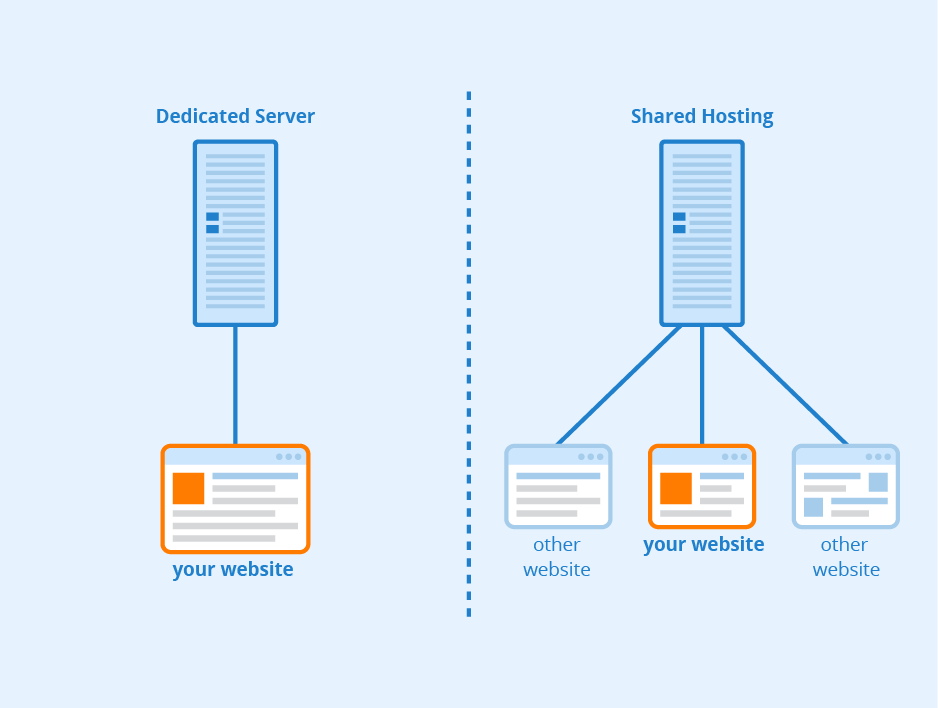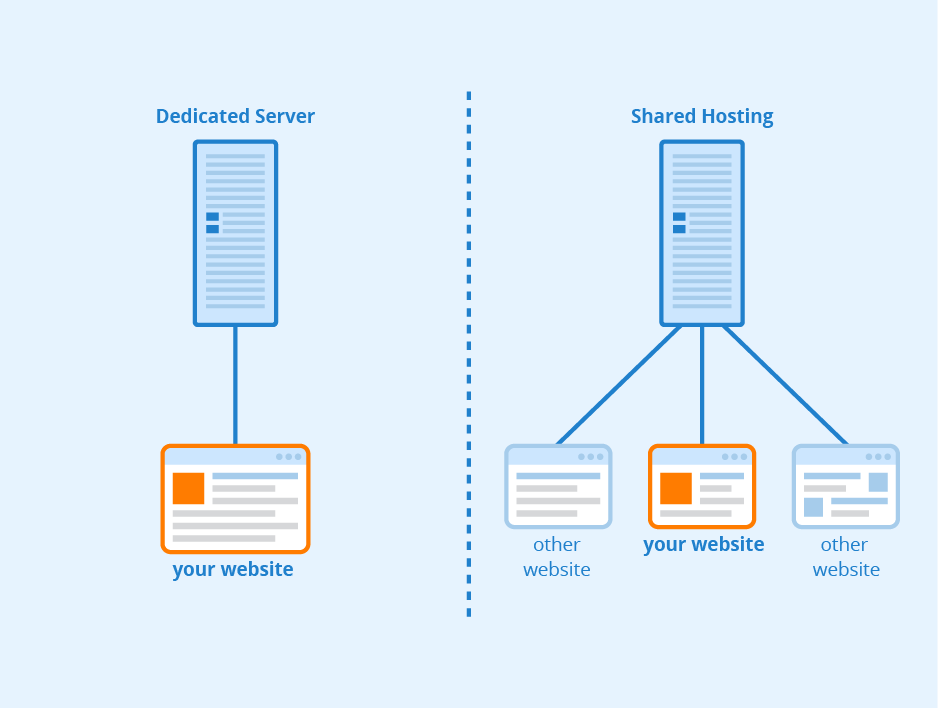VPS hosting offers numerous advantages over shared hosting. With VPS, you have dedicated resources, improved performance, and better scalability. You also have more control over your server environment and can customize it to meet your specific needs. In contrast, shared hosting is more affordable but lacks the same level of performance and flexibility. Ultimately, the choice between VPS and shared hosting depends on your website’s requirements and budget.
When it comes to web hosting, the choice between VPS and shared hosting can be perplexing. But did you know that VPS hosting offers better performance and control compared to shared hosting? With VPS hosting, you get a dedicated portion of a server, allowing you to have your own resources and greater flexibility. No more worrying about other websites on the same server hogging resources and slowing down your site. VPS hosting is the solution for businesses and individuals looking for enhanced stability and performance.
Is VPS better than shared hosting? Absolutely! VPS hosting has evolved over the years to become a popular choice for hosting websites. In addition to the improved performance and control, VPS hosting also provides better security and scalability. You have the ability to customize your server environment to meet your specific needs, and you can easily scale resources up or down depending on your requirements. With VPS hosting, you get the best of both worlds: the cost-effectiveness of shared hosting and the power and control of dedicated hosting. It’s no wonder that VPS hosting is the preferred choice for growing businesses and demanding websites.

Understanding the Differences Between VPS and Shared Hosting
When it comes to web hosting, two popular options are VPS (Virtual Private Server) and shared hosting. Both options have their advantages and disadvantages, but it’s essential to understand the differences between the two before making a decision.
Shared hosting is a type of hosting where multiple websites share the same server and its resources. It’s a more affordable option, making it popular among small businesses and individuals with limited budgets. In shared hosting, your website will share the server’s CPU, RAM, and other resources with other websites.
On the other hand, VPS hosting is a type of hosting where your website resides on a virtual private server that simulates a dedicated server environment. With VPS hosting, you have dedicated resources that are not shared with other websites on the server. This gives you more control, stability, and flexibility compared to shared hosting.
It’s important to note that the choice between VPS and shared hosting depends on your specific needs and requirements. Let’s explore the key differences between the two options to help you make an informed decision.
Resource Allocation and Performance
One of the primary differences between VPS and shared hosting is resource allocation and performance. In shared hosting, resources such as CPU, RAM, and disk space are shared among multiple websites, which can lead to performance issues if one website utilizes a significant portion of the resources.
With VPS hosting, you have dedicated resources allocated to your website. This means that the performance of your website is not impacted by the activities of other websites on the server. You have more control over the resource allocation and can scale resources as needed to ensure optimal performance.
VPS hosting also offers better stability compared to shared hosting. Since your website is isolated from other websites, you are not affected by traffic spikes or resource-intensive activities of other users. This ensures a more consistent and reliable performance for your website.
If your website experiences high traffic or requires significant resources, VPS hosting is generally a better option as it provides greater scalability and performance.
Security and Privacy
Another crucial factor to consider when comparing VPS and shared hosting is security and privacy. In shared hosting, the security measures implemented by the hosting provider apply to all websites on the server. This can pose a higher risk, especially if one website on the server is compromised.
VPS hosting offers enhanced security and privacy compared to shared hosting. Since your website is isolated in its virtual environment, it is less susceptible to security breaches caused by other websites on the server. You have more control over the security measures and can implement stricter security protocols to protect your website.
Additionally, with VPS hosting, you have the option to configure a firewall and install security software specific to your website’s needs. This provides an additional layer of protection and reduces the risk of unauthorized access to your website and sensitive data.
If security and privacy are top priorities for your website, VPS hosting is a more suitable choice.
Customization and Control
VPS hosting provides a higher level of customization and control compared to shared hosting. With shared hosting, you have limited control over the server environment and the software installed since it is managed by the hosting provider.
On the other hand, VPS hosting allows you to have root access to your virtual server, giving you complete control over the server environment. You can install and configure any software or applications that meet your website’s requirements. This level of customization and control is particularly beneficial for websites that need specific software or have unique hosting needs.
With VPS hosting, you can also scale resources based on your website’s needs. If you anticipate an increase in traffic or require additional storage, you can easily upgrade your resources without any downtime. This flexibility allows you to adapt to changing demands and ensures optimal performance for your website.
Shared hosting, on the other hand, offers limited customization options and may not be suitable for websites that require specific configurations or have complex hosting needs.
Cost Differences
Cost is often a significant factor when choosing a hosting option. Shared hosting is generally more affordable compared to VPS hosting since the server resources are shared among multiple websites, reducing the overall cost.
However, the cost difference also reflects the differences in the level of performance, control, and security offered by each hosting option. VPS hosting may come at a higher price, but it provides better performance, enhanced security, and greater control over your website.
If you have a limited budget or have a small website with moderate traffic, shared hosting can be a cost-effective choice. But if you require more resources, improved performance, and additional security measures, VPS hosting is worth considering, even though it comes at a higher cost.
Conclusion
Ultimately, the choice between VPS and shared hosting depends on your specific needs, budget, and the requirements of your website. Shared hosting is a suitable option for small websites with limited resources, while VPS hosting offers better performance, security, customization, and scalability for websites that require more control and resources.
Consider your website’s needs, evaluate the pros and cons of each hosting option, and choose the one that aligns with your goals and requirements. Remember, the right hosting choice can significantly impact your website’s performance, security, and overall success.
For more information on web hosting options or to explore different hosting plans, you can visit [insert link to hosting provider] and find the best solution for your website’s needs.
Key Takeaways:
- VPS hosting offers more resources and better performance than shared hosting.
- VPS hosting gives you more control and customization options.
- Shared hosting is more affordable and easier to manage for small websites.
- VPS hosting is recommended for growing businesses and websites with higher traffic.
- Consider your specific needs and budget when choosing between VPS and shared hosting.
When it comes to choosing between VPS (Virtual Private Server) and shared hosting, there are a few key factors to consider. VPS hosting offers more flexibility, control, and resources compared to shared hosting.
With VPS hosting, you have your own dedicated virtual server that provides better performance and security. You can customize the server settings based on your specific needs, and you don’t have to worry about other websites impacting your server’s performance. On the other hand, shared hosting involves sharing server resources with multiple users, which can result in slower load times and limited control over server settings.

